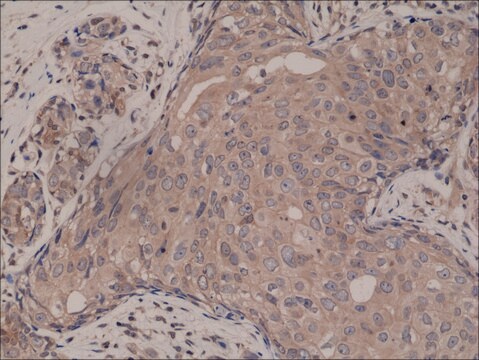推荐产品
生物源
mouse
品質等級
100
500
共軛
unconjugated
抗體表格
culture supernatant
抗體產品種類
primary antibodies
無性繁殖
HHF35, monoclonal
描述
For In Vitro Diagnostic Use in Select Regions (See Chart)
形狀
buffered aqueous solution
物種活性
human
包裝
vial of 0.1 mL concentrate (201M-94)
vial of 0.5 mL concentrate (201M-95)
bottle of 1.0 mL predilute (201M-97)
vial of 1.0 mL concentrate (201M-96)
bottle of 7.0 mL predilute (201M-98)
製造商/商標名
Cell Marque™
技術
immunohistochemistry (formalin-fixed, paraffin-embedded sections): 1:10-1:50
同型
IgG1κ
控制
skeletal muscle
運輸包裝
wet ice
儲存溫度
2-8°C
視覺化
cytoplasmic
一般說明
Mucins are a diverse group of complex, highly glycosylated extracellular proteins. Mucin 2 (MUC2) protects the gastric and intestinal epithelium from chemical and mechanical injury. Anti-MUC2 reactivity is normally seen in goblet cells of the small intestine and colon and is associated with mucinous carcinomas, including those of the gastrointestinal tract and ovary. MUC2 immunohistochemistry is useful for identifying colonic, gastric, and esophageal carcinomas.
Muscle Specific Actin is a part of the actin family of proteins which are highly conserved, major components of the cytoskeleton. Anti-Muscle Specific Actin immunohistochemical reactivity is seen in skeletal, cardiac, and smooth muscle cells and can be seen in neoplasms with muscle differentiation such as leiomyomas and rhabdomyosarcomas. In contrast, anti-Muscle Specific Actin reactivity is typically not seen in endothelial cells, connective tissues, carcinomas, melanomas, lymphomas, and most non-myogenic sarcomas.
品質
 IVD |  IVD |  IVD |  RUO |
聯結
Actin, Muscle Specific Positive Control Slides, Product No. 201S, are available for immunohistochemistry (formalin-fixed, paraffin-embedded sections).
外觀
Solution in Tris Buffer, pH 7.3-7.7, with 1% BSA and <0.1% Sodium Azide
準備報告
Download the IFU specific to your product lot and formatNote: This requires a keycode which can be found on your packaging or product label.
其他說明
For Technical Service please contact: 800-665-7284 or email: service@cellmarque.com
法律資訊
Cell Marque is a trademark of Merck KGaA, Darmstadt, Germany
Not finding the right product?
Try our 产品选型工具.
R A Schmidt et al.
The American journal of pathology, 131(1), 19-28 (1988-04-01)
The authors have recently developed a monoclonal antibody, HHF35, that recognizes the muscle-specific isoforms of actin. To determine its potential usefulness in the differential diagnosis of "small, round, blue cell" tumors of childhood, they immunolabeled formalinor B-5-fixed tissue sections from
N Azumi et al.
Modern pathology : an official journal of the United States and Canadian Academy of Pathology, Inc, 1(6), 469-474 (1988-11-01)
Two fibrillary proteins, muscle-specific actin (MSA) and desmin, are found only in cells of smooth and skeletal muscle lineages. Among the monoclonal antibodies (MAbs) to these antigens which we have tested, we found several to be reactive in formalin-fixed, paraffin-embedded
Comparative immunohistochemical staining for desmin and muscle-specific actin. A study of 576 cases.
S Rangdaeng et al.
American journal of clinical pathology, 96(1), 32-45 (1991-07-01)
Muscle-specific actin (MSA) and desmin are considered to be sensitive and specific markers for muscle differentiation. The authors compared staining patterns for these markers in 576 samples of normal, reactive, and neoplastic tissues. The standard avidin-biotin-peroxidase complex technique was performed
T Tsukada et al.
The American journal of pathology, 127(2), 389-402 (1987-05-01)
Monoclonal antibody HHF35 has previously been characterized biochemically as recognizing isotypes of actin (alpha and gamma) which are specific to muscle cells. In this study, the authors have investigated the normal and pathologic tissue distribution of HHF35-positive cells using the
Tawar Qaradakhi et al.
Calcified tissue international, 105(5), 546-556 (2019-09-06)
Low circulating levels of undercarboxylated osteocalcin (ucOC) is associated with a higher risk of cardiovascular disease, yet whether ucOC has a direct effect on endothelium-dependent vasorelaxation, or in proximity to its postulated receptor, the class CG protein-coupled receptor (GPCR6A), in
我们的科学家团队拥有各种研究领域经验,包括生命科学、材料科学、化学合成、色谱、分析及许多其他领域.
联系技术服务部门

